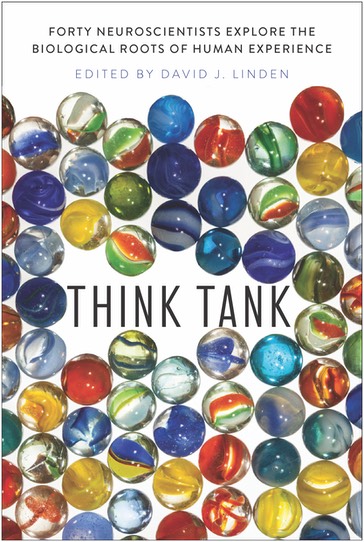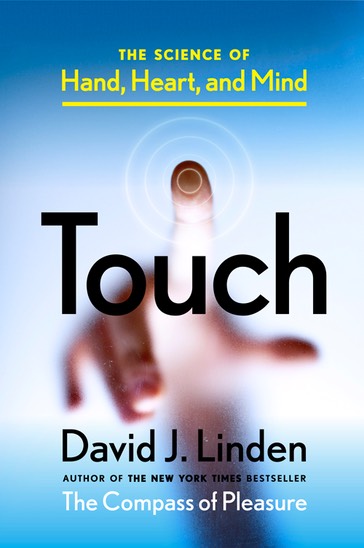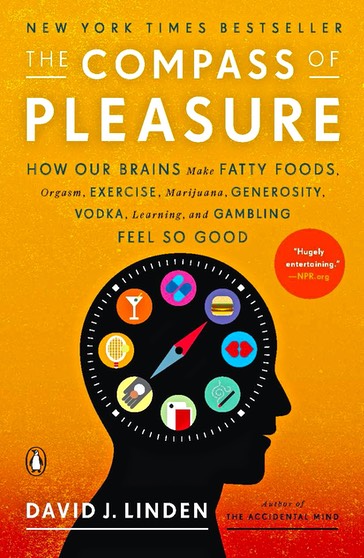"The book’s greatest strength is Linden’s knack for demystifying biology and neuroscience with vivid similes (he calls the brain, weighing two percent of total body weight and using 20 percent of its energy, the “Hummer H2 of the body”). Though packed with textbook-ready data, the book grips readers like a masterful teacher; those with little science experience may be surprised to find themselves interested in—and even chuckling over—the migration of neurons along radial glia, and anxious to find out what happens next"
-Publisher’s Weekly (starred review)
"Linden tells his story well, in an engaging style, with plenty of erudition and a refreshing honesty about how much remains unknown. The book should easily hold the attention of readers with little background in biology and no prior knowledge of brains. It would make an excellent present for curious non-scientists and a good book for undergraduates who are just entering into the brain's magic menagerie. Even readers trained in neuroscience are likely to enjoy the many tidbits of rarely taught information — on love, sex, gender, sleep and dreams — that spice up Linden's main argument. The Accidental Mind stands out for being highly readable and clearly educational."
-Nature, Georg Striedter
"Let others rhapsodize about the elegant design and astounding complexity of the human brain—the most complicated, most sophisticated entity in the known universe, as they say. David Linden, a professor of neuroscience at Johns Hopkins University, doesn't see it that way. To him, the brain is a "cobbled-together mess." Impressive in function, sure. But in its design the brain is "quirky, inefficient and bizarre ... a weird agglomeration of ad hoc solutions that have accumulated throughout millions of years of evolutionary history," he argues in his new book, The Accidental Mind, from Harvard University Press. More than another salvo in the battle over whether biological structures are the products of supernatural design or biological evolution (though Linden has no doubt it's the latter), research on our brain's primitive foundation is cracking such puzzles as why we cannot tickle ourselves, why we are driven to spin narratives even in our dreams and why reptilian traits persist in our gray matter."
-Newsweek, Sharon Begley
"Linden's story is captivating. Chapter by chapter he builds his compelling arguments, starting with a close examination of the human brain's structural flaws and the shortcomings of its parts."
-Scientific American MIND, Nicole Branan
"[Linden] argues persuasively that our brains are wonderful "kludges"- perfect examples of what millennia of small changes can achieve in the total absence of overarching design principles and no ability to start afresh... The majority of this book is an enjoyable neurosciences primer for the general reader. Evolutionary and psychological perspectives provide occasional insights about the mnd, but mostly the subject here is the organ capable of conjuring it into existence. Linden makes clear that it is the physical substrate of our mental phenomena- the squidgy and and haphazard mass of our brain- is a gloriously evolved muddle."
-Times Literary Supplement (UK), Druin Burch
"The Accidental Mind is well suited for a wide audience. Nonscientists and newcomers to neurobiology will appreciate Linden's clearly articulated overviews of such complicated topics as the brain's cellula architecture, neurotransmission, neural development, and the molecular and cellular basis of memory. Linden does an excellent job of providing detail on these subjects, but not so much that the reader feels like the “soul is departing their body” (as he jokes is often the case with neurobiology books). Neurobiologists such as ourselves will find much of the book to be review, but there are enough offbeat stories, colorful examples, and thought-provoking speculations to keep us interested throughout. (It might aid sales if the book were enclosed in plastic with a sticker on the outside advertising: “Want to learn why you can't tickle yourself? Why the genitals don't occupy a larger area of the sensory homunculus? How tooth brushing can provoke orgasms? Buy this book!”
-Neuron, Zachary Scheiner and Daniel Storm
"Linden, a well-known expert on synaptic plasticity, does an unusually good job of balancing entertainment and accuracy. He does not patronize readers and is careful to avoid the oversimplifications that plague neuroscience journalism (a brain center for love, a gene for adultery, and so on)... [The Accidental Mind] is entertaining, intellectually stimulating, well written and scientifically authoritative. Although not a textbook, The Accidental Mind would make an excellent introduction to the field for nonspecialist students, or for anyone else wanting an introduction to neuroscientific thinking and to the types of explanations that neuroscience can (and cannot) offer to some of life's great mysteries."
-Nature Neuroscience, Charles Jennings
"Many popular neuroscience books emphasize the brain's complexity using terms of purpose: this region is for emotion, that one for vision, and so forth, each interacting in a perfectly designed whole. This ambitious, engaging, and often irreverent book by Linden (Johns Hopkins Univ.) adopts a quite different perspective, instead emphasizing the evolutionary origins of the human brain... Summing Up: Highly recommended."
-Choice: Current Reviews for Academic Libraries, S.A. Huettel
"It is among the most engaging and interesting books I have read in recent times....Linden's The Accidental Mind will convince you of our evolutionary past, fascinate you with the most interesting example I have seen an author use, and shed light on the connection between the human experience, the brain, and the past"
-PsycCritiques (American Psychological Association Review of Books), Elizabeth Shobe
"Either way, Linden's point is made: the magnificent brain and the mind that it fabricates are just more accidents of evolution, a series of modules of various capacities that that developed for different reasons and then piled on top of one another like, as Linden puts it, so many scoops of ice cream melting together in messy, if often delightful ways."
-Harper's Magazine, Gary Greenberg
"Linden's style is breezy, making the book a surprisingly easy read for the non-expert. One of the points that the book makes is that memory is tied to emotions and Linden has certainly learned this lesson, managing to explain the basic facts of how the brain works while keeping 'the audience' engaged emotionally with the topic. Indeed, his chapter on sex looks at human proclivities with the sharp eye of a practiced comic, all the while actually explaining the science. I can't help but think that Linden is one hell of a dinner party guest."
-Metapsychology Online Reviews, Konrad Talmont-Kaminski
"Even those of us of a hard‐line, naturalist stance often assume that when it comes to us humans, although there might be one or two flaws—childbirth, for instance—by and large, we are put together pretty well. Above all, our brains are first‐rate computers and here, indeed, natural selection did as well as God. In this entertaining book on modern brain science, Linden sets out to disillusion us of this kind of thinking and shows that the human brain is just as much a string‐and‐sealing‐wax contraption as so many other parts of our bodies and those of others. Overall, this is a good introductory primer to modern brain science and, as such, I welcome and praise it."
-Quarterly Review of Biology, Michael Ruse
"The human brain's reputation is that of an impeccably designed machine, able to perform functions well beyond the scope of any supercomputer. While the brain's capabilities are remarkable, its design is not, asserts brain researcher Linden. Instead, the 3-pound lump of flesh has been cobbled together by millions of years of evolution. In this survey of the brain for lay readers, Linden attempts to explain the brain's ascendance to the seat of what makes a huma, human"
-Science News
"For anyone interested in a skillfully guided tour through the world of neural function, The Accidental Mind is a playful yet academically informed work that addresses issues as diverse as intelligent design, the fallibility of the senses, the human religious impulse, and the possible heritability of sexual orientation. Without overwhelming the reader with the biochemical underpinnings of neural function, Linden explores the role that neural design (structure and function) has in the explication of various human behaviors. Through the use of clear examples, comprehensible diagrams, and relevent case studies, Linden is able to flesh out the gritty details of brain function in a very non-gritty way."
-History and Philosophy of the Life Sciences, Charles J. Alt
"This is a fun and provocative book. Linden waltzes between humor and science, weaving together a coherent and persuasive argument that the products of the mind are much more amazing than the brain. He tackles sensitive subjects without a political ax to grind. He writes as well as a journalist but he is clearly always writing as a scientist."
-Dispute Resolution Alert, Richard Birke
“The Accidental Mind's greatest strength is demystifying biology and neuroscience into understandable human terms for the nonscientist. His writing is witty and engaging."
-Public Libraries Association, Dr. Terri Maggio
"The Accidental Mind is utterly readable and really quite delightful"
-WGN Radio, Milt Rosenberg
"This is a terrific book that accomplishes its aim of presenting a biological view of how the brain works, and does so in a charming, fetching style."
-Joshua R. Sanes, Professor of Molecular and Cellular Biology, Harvard University
" This is a very intelligent book."
-John Lisman, Professor of Biology, Brandeis University



